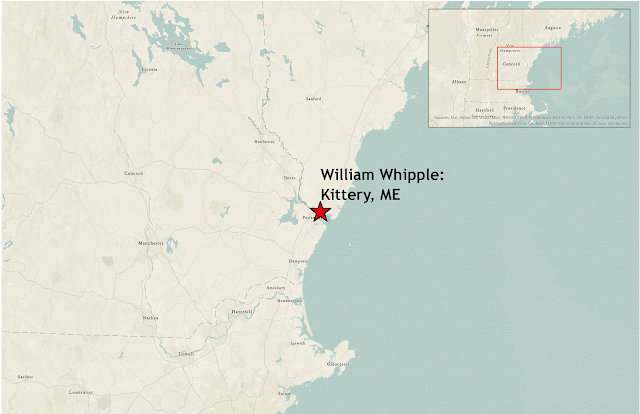Founding Fathers - William Whipple
William Whipple
Born: January 14, 1730 (Kittery, Massachusetts - now part of Maine)
Died: November 28, 1785 (Portsmouth, New Hampshire)
On this Memorial Day weekend, I first want to pause and remember those brave souls who served their countries with everything they had. Every one of us who lives in a land of freedom does so because of the sacrifice of others who gave up their chance at having such a life. We owe them so much more than our gratitude, but we should certainly give that freely whenever the opportunity presents itself. Thank you.
This week we will meet our third William in this series that focuses on signers of the Declaration of Independence, and with the military emphasis of the holiday I thought it would be fitting to select a Founding Father who proudly wore the uniform of his nation. Therefore we get to meet William Whipple who was born in modern-day Maine, although it was then part of the Massachusetts colony. The town of Kittery was a port just across the river from Portsmouth, New Hampshire, and was where his parents, a father also named William and his wife Mary, had moved some years earlier. Young William received the common education available at the time to boys, while also being tutored by his mother's Harvard-educated cousin, Robert Gerrish. Once his schooling was complete, he began his life at sea by serving on one of his father's merchant ships. By the age of 21, he had become the captain of his own ship.
William Whipple's time as a merchant sailor was quite profitable, and his travels to the West Indies and Africa brought him not only financial wealth but also a mature perspective on many of the issues of his time. By the year 1759, before he was even 30 years old, he left the sea and settled in Portsmouth, NH to run a mercantile business alongside two of his brothers. At the age of 37 Whipple married his first cousin, Catherine Moffat, and moved into a Portsmouth home owned by her family. The couple had a single child, named after his father, who died in infancy. At the same time, he was developing a reputation as a civic leader and was elected to a number of local posts as he championed the cause of colonial self-determination, including leading a group that prevented the import of tea into Portsmouth in 1774. His experience led him to reject British attempts to control commerce, and when New Hampshire dissolved their Royal government in favor of a provincial assembly, Whipple was elected as his town's representative.
When New Hampshire decided to send delegates to the Second Continental Congress in 1776, William Whipple was one of three men selected. Although he was present for the signing of the Declaration of Independence, his attention was divided between Congress and the military. He had attained the rank of Brigadier General in the New Hampshire militia and was known for favoring aggressive military action. At the Battle of Saratoga, he led four divisions to help lay siege to the British forces and was one of the officers present to accept British General Burgoyne's surrender on October 17, 1777. Another notable facet of his life during the war was his realization that fighting for freedom was a cause for all men, and as such this former sailor who had likely participated in the slave trade decided to free his only slave, a man named Prince. The two fought side-by-side for the duration of the war, including during a campaign in the Battle of Rhode Island where Whipple was nearly killed by a nearby exploding artillery shell. In his personal correspondence, he began sharing hopes that slavery would give way to the blessing of freedom for all people, and he continued to use his influence in public service to accomplish that purpose as the war came to a close, despite his own deteriorating health. In 1780 Whipple was once again elected to the state assembly, followed two years later by an appointment as a judge to the New Hampshire Superior Court. Unfortunately, the travel required by this position was too much for him to handle, and in 1785 he died from an apparent heart attack while riding his circuit. He was buried alongside his family, including Prince, in Portsmouth's Old North Cemetery.
The signature of William Whipple can be found as the second name on the sixth (farthest right) column beneath the Declaration of Independence.



Comments
Post a Comment